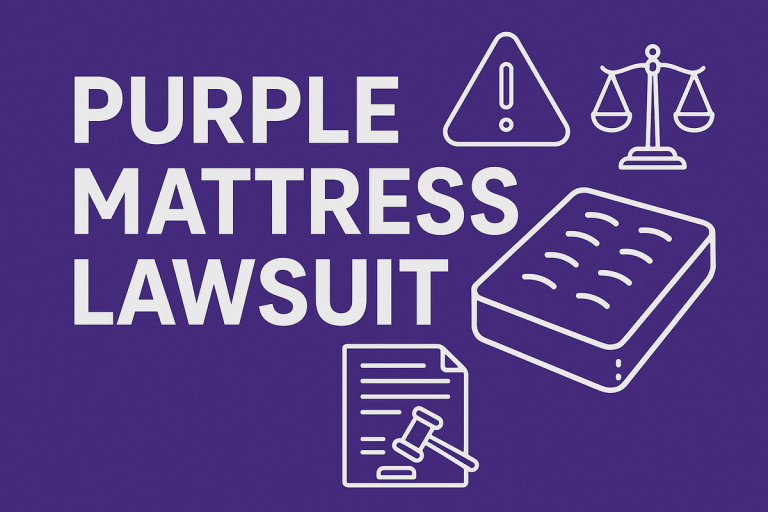The Girl Scouts Cookies lawsuit shakes a beloved American tradition. Every spring, families buy Thin Mints, Samoas, and many other favorites. Now, a serious legal challenge raises safety questions for millions of cookie fans across the United States. Plaintiffs filed the case in March 2025. They claim some Girl Scout Cookies contain heavy metals and pesticide residues. Reports cite possible lead and cadmium levels above safe limits. Consumers feel concerned and want clear answers.
This article explains the lawsuit in simple language. It highlights key allegations, court actions, and potential effects on cookie buyers and local troops. Readers will find practical steps to stay informed and protect their families. Girl Scout Cookies remain a symbol of community and service. Yet health and trust matter more. Follow the updates and share this guide. Stay alert as the court reviews the claims and decides the next steps.
Lawsuit Details and Timeline
The Girl Scouts Cookies lawsuit began on March 11, 2025. Plaintiffs filed a federal class-action case against Girl Scouts of the USA. They also named two licensed bakeries: Little Brownie Bakers and ABC Bakers.
Who Filed the Lawsuit
Parents and consumer advocates lead this action. Families from California, New York, Illinois, and Texas joined the complaint. Their attorneys focus on consumer safety and food contamination cases. Supporters want compensation and stronger production standards.
Key Allegations
The lawsuit alleges that several cookie flavors contain heavy metals, including lead and cadmium. Independent labs allegedly found amounts above California Proposition 65 limits. Plaintiffs also cite pesticide residues that may harm children and adults. They argue buyers trusted the brand’s promise of safe treats.
Early Court Activity
The court accepted the filing and appointed a federal judge to preside over the case. Attorneys quickly exchanged evidence requests and inspection demands. Initial hearings handled scheduling and jurisdiction issues. National outlets such as Forbes and USA Today reported every development.
Regulatory Interest
State health departments collected cookie samples for testing. The U.S. Food and Drug Administration reviewed reports and assessed possible federal violations. Officials considered consumer advisories but announced no recall. Agencies continue monitoring production facilities and supply chains.
Discovery Phase
Attorneys scheduled extensive laboratory tests of Thin Mints, Samoas, and Tagalongs. Experts will check for the presence of heavy metals and pesticide residues. Both sides must share test results before the trial. Discovery may reveal production records, supplier agreements, and prior internal testing results.
Upcoming Deadlines
The judge set a discovery conference for late summer 2025. Attorneys must present lab data and expert analysis. Mediation may occur before trial. Observers expect motions to dismiss or settle before the end of the year.
Possible Class Certification
Plaintiffs seek nationwide class certification. The court will decide whether all U.S. cookie buyers qualify as a single class of plaintiffs. Approval would increase damages and extend legal reach.
Legal Claims Explained
The Girl Scouts Cookies lawsuit presents several serious legal claims. Each claim targets consumer safety, accurate labeling, and responsible corporate behavior.
Consumer Protection Violations
Plaintiffs argue the organization violated multiple state consumer protection statutes. These laws guard buyers against unsafe products and deceptive marketing. Attorneys state that the Girl Scouts of the USA failed to alert consumers about potential heavy metal and pesticide residues. Families bought cookies believing they were safe. Legal teams claim that the omission misled millions of buyers.
Breach of Warranty
The lawsuit alleges breach of implied warranties. Every purchase carries an implied promise that food is safe and fit to eat. Plaintiffs argue that contaminated cookies breach that promise. Attorneys emphasize that buyers trusted the brand’s long history and community reputation. Courts may require proof that contamination existed at the time of sale.
False Advertising
Lawyers cite advertising that describes cookies as wholesome and carefully tested. Plaintiffs believe those statements misled parents and children. They highlight promotional materials that stress quality ingredients and strict baking standards. If lab results confirm the presence of heavy metals, courts may rule those ads false. Judges will examine packaging, online marketing, and troop sales flyers.
Negligence
The complaint includes negligence claims against Girl Scouts leadership and the bakeries. Attorneys argue managers ignored early warnings about ingredient sourcing risks. Plaintiffs claim that routine quality audits failed to detect the contamination. The court will review supplier contracts, inspection records, and any prior consumer complaints.
Request for Damages
Plaintiffs seek several remedies. They are requesting full refunds for all affected buyers. They also request funding for medical monitoring of exposed families. Attorneys demand punitive damages to discourage future safety lapses. Courts could also order stricter quality controls across the cookie program.
Possible Outcomes
Several outcomes remain possible. The judge could dismiss parts of the case or allow every claim to proceed. A settlement might include cash payments, new testing requirements, and updated labels. Regulators may recommend recalls or impose additional oversight. Consumers will learn more as hearings continue through 2025.
Impact on Consumers and Cookie Sales
The Girl Scouts Cookies lawsuit directly affects millions of buyers. Consequently, shoppers want clear facts about product safety and sales changes.
Immediate Consumer Concerns
First, parents question whether their families should eat the remaining cookies. Many buyers check packaging dates and batch codes immediately. Furthermore, some households contact local councils to ask about testing or refunds. Therefore, troops receive frequent calls and emails from anxious supporters.
Health Considerations
Doctors explain that occasional exposure to trace heavy metals rarely causes sudden illness. However, experts warn that long-term exposure may harm children. Thus, health departments encourage moderation until official test results appear. Consequently, many families limit their consumption until the authorities complete their investigations.
Cookie Sales and Fundraising
Troops depend on cookie revenue to fund activities and camps. Hence, negative headlines create real financial pressure. Moreover, some schools and businesses hesitate to host cookie booths this season. As a result, local councils track sales daily and adjust their goals accordingly. Still, loyal buyers continue purchasing boxes to support girls and community programs.
Public Reactions
News reports spread quickly across social media. Consequently, many consumers share concerns or demand independent lab tests. Yet others defend the Girl Scouts brand and highlight decades of trusted service. Because opinions differ, overall demand varies widely across states.
Possible Price Changes
If bakers face extra testing costs, future cookie prices could rise. Therefore, councils closely monitor production expenses. Additionally, any mandated safety upgrades might increase shipping or packaging fees.
Ongoing Communication
Local councils frequently post updates on their official websites. Additionally, national Girl Scouts leaders release statements promising transparency and rigorous testing. Thus, buyers can track progress and make informed purchasing decisions.
Economic Impact on Local Councils
The Girl Scouts Cookies lawsuit reaches far beyond kitchens and courtrooms. Local councils rely heavily on cookie sales to fund year-round activities. Consequently, even small dips in sales can strain budgets for camps, service projects, and leadership programs. Many troop leaders already report slower booth traffic in some cities. Parents say that curious shoppers now ask more detailed questions before making a purchase. Due to these concerns, councils monitor weekly sales and adjust their fundraising goals accordingly. Some regions launch extra digital campaigns to offset potential shortfalls.
If a large settlement or mandated testing increases costs, councils might face higher wholesale prices. Therefore, troops could see smaller profits per box. Still, many loyal customers continue buying cookies to support girls and community initiatives. That dedication provides a financial cushion during uncertain months.
Expert Opinions and Insights
Girl Scouts Cookies lawsuit draws broad interest from food scientists, legal experts, nutritionists, and consumer activists. Thus, each of these groups provides in-depth analysis and possible remedies.
Food Safety Experts
Food scientists explain how heavy metals contaminate crops via tainted soil and irrigation water. Hence, they suggest frequent soil analysis at farms that provide cookie material. Furthermore, they also call for bakeries to insist on certificates of analysis for all shipments of flour, sugar, and cocoa. Experts cite that lead and cadmium accumulate in the body over time and can cause harm to the nervous system. But they reiterate that intermittent exposure seldom results in immediate symptoms in healthy adults. As such, they call for nationwide screening of ingredients and enhanced agricultural monitoring programs.
Nutrition Experts
Registered dietitians remind families that cookies must be an occasional indulgence. Therefore, they advise restricting processed sweets and pairing meals with fruits, vegetables, and whole grains. They also advise cycling through snack options to minimize exposure to possible contaminants.
Nutrition professionals also suggest the need for calcium and iron in diets, as these minerals can help curb the absorption of heavy metals. They also advise parents to teach children about moderation during cookie season. This guidance ensures that families continue to maintain healthy practices, even during a well-liked fundraising campaign.
Legal Analysts
Lawyers watching the Girl Scouts Cookies lawsuit present several legal options. They anticipate a thorough discovery that will scrutinize manufacturing records, vendor agreements, and past quality tests. Thus, they anticipate motions to dismiss certain claims but recognize a high probability of class certification. In addition, they think settlement talks may start as soon as laboratory test results become available. Legal experts also caution that companion food contamination lawsuits usually take years to be resolved in a final judgment. Therefore, they urge consumers to monitor court filings and formal announcements for reliable updates.
Consumer Advocacy Groups
Consumer activists call for open ingredient sourcing and independent third-party testing of each batch of cookies. Therefore, they urge the Food and Drug Administration to establish national thresholds for heavy metals in baked items. Moreover, they also call for unambiguous labeling, which indicates farms, processing facilities, and testing dates. Associations also launch petitions calling on Girl Scouts of the USA to release internal audit findings. Thus, these actions compel manufacturers to enhance safety measures and uphold the people’s trust.
Industry Watchers
Financial analysts monitor financial impact on nonprofit fundraising and corporate image. They observe that adverse publicity has the potential to depress cookie sales and lower overall donations to Girl Scout programs. Yet they also note intense brand loyalty and years of community work that might shield long-term support. Thus, they anticipate short-term shortfalls in sales but forecast rebounding once investigations are closed. Additionally, they suggest local councils enhance digital sales and diversify fundraising events to mitigate potential revenue loss.
Regulatory Path Forward for Food Safety
This lawsuit also highlights the potential evolution of U.S. food safety regulations. The FDA already reviews heavy metal limits in baked goods and snacks. Because public pressure often accelerates policy changes, regulators may announce new national standards sooner than expected. Lawmakers in several states are discussing bills that require routine third-party testing for all large food producers.
If those proposals pass, bakeries would need to have documented lab results before their products reach the shelves. Moreover, new rules could mandate transparent ingredient sourcing, giving consumers easier access to supplier information. Legal analysts predict that the FDA might release updated guidance within a year. Consequently, manufacturers across the snack industry could face stricter monitoring and more frequent inspections. Such changes would likely influence not only Girl Scout Cookies but also many other packaged treats sold nationwide.
What Consumers Can Do
The Girl Scouts Cookies lawsuit worries many U.S. shoppers. Therefore, careful actions help families stay safe and informed.
Track Reliable Updates
Check the Girl Scouts of the USA website every week. Consequently, you will see official statements and testing results. Additionally, visit the U.S. Food and Drug Administration website to read inspection findings and public notices. Trusted news outlets, such as Reuters and USA Today, also provide timely updates on developments in the case.
Check Packaging and Batch Codes
Look closely at box labels before eating or serving cookies. Therefore, record production dates, plant numbers, and expiration codes. Moreover, compare that information to any recall announcements. Report suspicious batches to local councils or the national hotline immediately.
Limit Cookie Consumption
Health agencies recommend a moderate intake until the investigations are completed. Thus, serve small portions and store leftovers securely in airtight containers. Furthermore, opt for fresh fruit or whole-grain crackers to minimize potential exposure to heavy metals and pesticide residues.
Request Refunds or Returns
Local councils already accept refund or replacement requests. Consequently, contact troop leaders or council offices for instructions.
Also, keep digital or paper receipts to speed processing. Document box codes to verify your purchase.
Seek Medical Guidance
Consult a doctor if you fear heavy metal exposure. Therefore, consider a simple blood test to check for lead or cadmium levels. Additionally, pediatricians can advise on nutrition that limits the absorption of harmful metals.
Share Accurate Information
Spread confirmed facts through neighborhood groups and social media. Consequently, your community avoids panic and misinformation. Moreover, sharing trusted resources supports calm and informed decisions.
Similar Past Cases and Lessons Learned
Food contamination lawsuits in the United States show how quickly a beloved product can land in court. These examples help explain what may happen as the Girl Scouts Cookies lawsuit moves forward.
Baby Food and Heavy Metals
Several baby-food brands faced lawsuits after tests revealed lead, arsenic, and cadmium. Parents felt shocked and demanded answers. As investigations expanded, state attorneys general pressed for stronger federal standards. Companies agreed to multimillion-dollar settlements and promised stricter sourcing of ingredients. Eventually, Congress held hearings that pushed the FDA to propose tighter limits on heavy metals in baby food. Due to this public pressure, new national guidelines now require routine testing and transparent labeling.
Breakfast Cereal and Glyphosate
A major cereal maker once battled claims that glyphosate, a common weed killer, tainted oat-based products. Independent labs confirmed trace amounts. Therefore, the company introduced lower pesticide limits and hired third-party auditors to ensure compliance. Retailers briefly pulled boxes from shelves until safety assurances improved. Although sales initially dipped, they later rebounded after new labels and public test results restored consumer trust.
Peanut Butter and Salmonella
Years ago, a peanut-butter producer recalled millions of jars following a Salmonella outbreak. Hundreds became sick across several states. Federal prosecutors pursued criminal charges against executives for ignoring early warnings. The company paid heavy fines and overhauled its entire sanitation system. Since then, routine FDA inspections and mandatory hazard plans have become standard in the nut-butter industry.
What These Cases Teach Us
Each incident demonstrates that lawsuits often lead to stronger safety standards. First, consumer complaints spark independent testing. Next, legal action compels the disclosure of supplier records and reveals hidden problems. Then, regulators tighten rules and require more transparent labels. Finally, companies rebuild trust through strict audits, transparent ingredient sourcing, and public reporting.
Why This Matters to Cookie Buyers
The Girl Scouts Cookies lawsuit shares themes with these earlier cases—claims of heavy metals, pesticide concerns, and worried families. Because courts and regulators have learned from past mistakes, today’s investigations may move more quickly. Consequently, consumers can expect regular updates, more demanding testing requirements, and, if needed, recalls or settlements. Staying informed and voicing concerns remain the best tools for every shopper.
Frequently Asked Questions
Are Girl Scout Cookies safe to eat right now?
Yes, cookie sales continue nationwide. However, the Girl Scouts Cookies lawsuit raises valid safety concerns about heavy metals and pesticide residues. Because investigations remain active, many nutrition experts recommend moderation until the final test results are available.
How can buyers check cookie boxes for safety?
Examine each box to locate the printed batch code and expiration date. Then compare those details with updates on the Girl Scouts of the USA website or official FDA recall alerts. That quick check provides an extra sense of peace of mind.
Will the lawsuit stop cookie sales this year?
Probably not. Local councils continue to sell while courts examine the evidence. Still, future cookie batches may face stricter quality testing and more transparent labeling.
Could cookie prices rise next season?
They might. If bakers pay more for additional testing, packaging changes, or upgraded farms, councils could raise prices slightly to cover costs.
What should parents do if worried about exposure?
Parents can talk to a pediatrician and request a simple blood test for lead or cadmium. This step offers reassurance and early detection if any exposure occurred.
Key Takeaways and Final Thoughts
The Girl Scouts Cookies lawsuit reminds everyone that even beloved brands can face serious safety questions. Past food contamination lawsuits in the United States often led to stricter standards and stronger consumer protections. Because of those lessons, regulators now move more quickly, and companies respond more promptly when concerns arise.
Stay informed through official Girl Scouts statements, FDA announcements, and trustworthy news outlets. Meanwhile, enjoy cookies in moderation and check packaging details before serving them to family or friends. If a recall ever occurs, keep your receipts and box codes to claim refunds or replacements promptly.
Girl Scout Cookies still symbolize community spirit and tradition. Yet health and transparency always come first. Continue to share accurate updates, support troops responsibly, and observe how this case influences future food safety regulations.
Ayesha Awais is a content writer for JudicialNexus.com, covering accident reports, injury-related news, lawsuits, and public safety updates. All content is informational in nature and based on publicly available sources.




